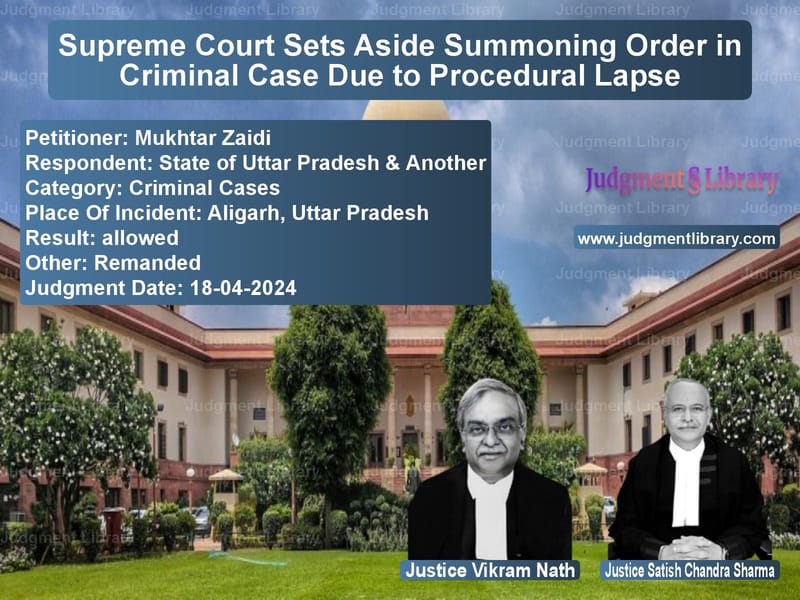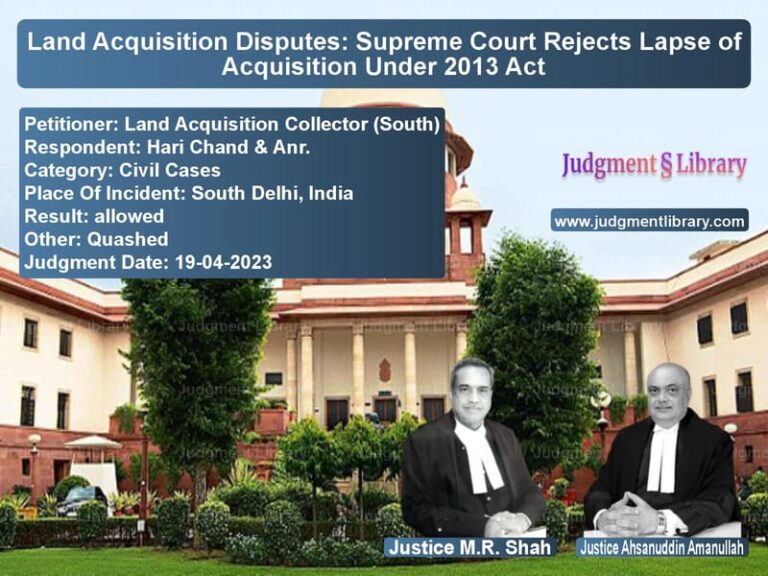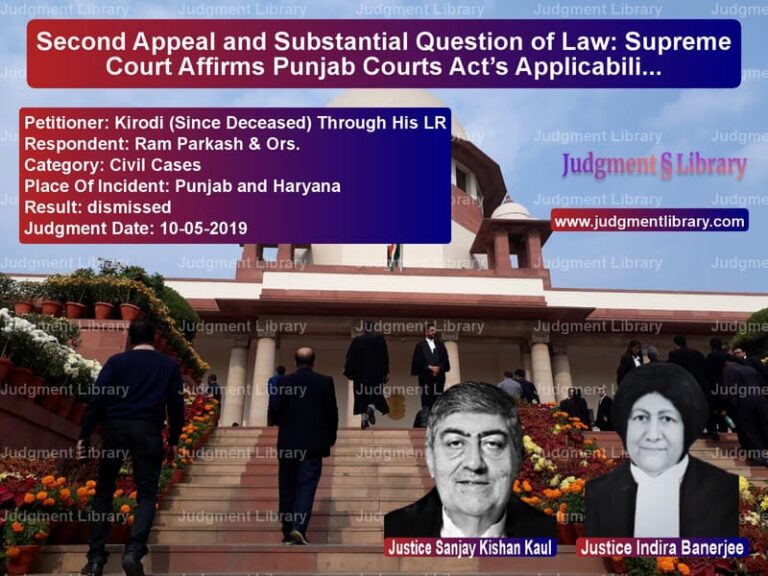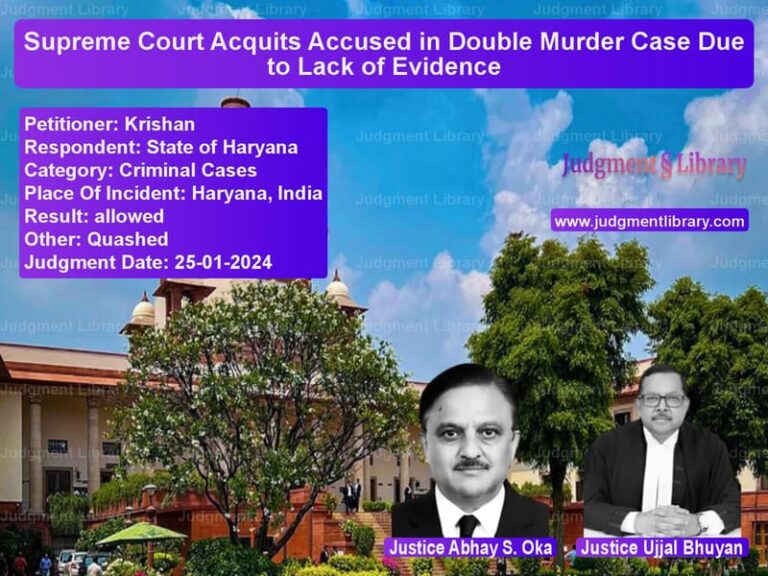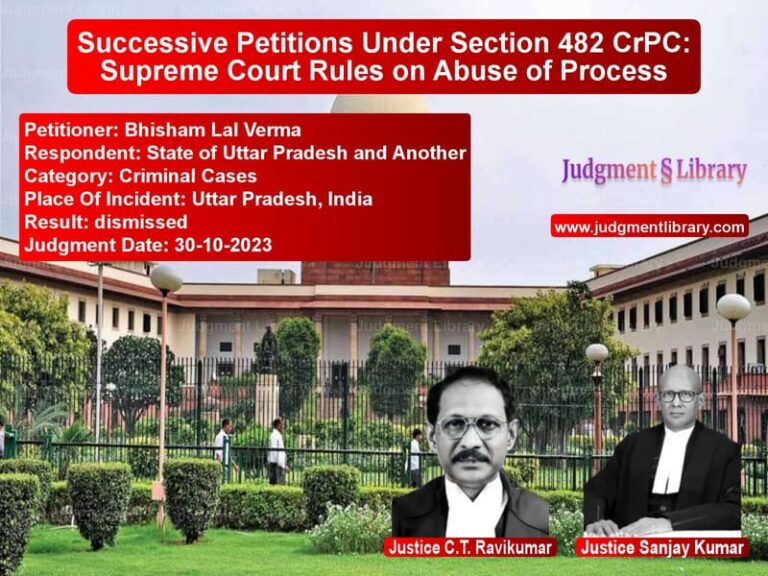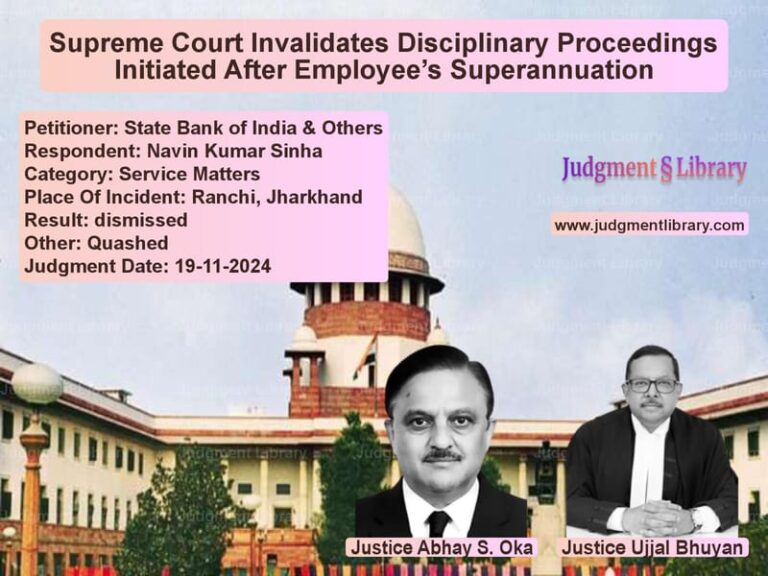Supreme Court Sets Aside Summoning Order in Criminal Case Due to Procedural Lapse
The case of Mukhtar Zaidi vs. State of Uttar Pradesh & Another highlights the importance of proper judicial procedures in criminal proceedings. The Supreme Court examined whether the Chief Judicial Magistrate (CJM) had correctly taken cognizance of a case after rejecting a police closure report. The ruling emphasized that when a magistrate relies on additional evidence, the case should be treated as a private complaint, requiring adherence to Chapter XV of the Code of Criminal Procedure (Cr.P.C.).
Background of the Case
The case originated when Respondent No. 2 lodged an FIR (First Information Report) at Civil Lines Police Station, Aligarh, against the appellant, Mukhtar Zaidi, under Sections 147, 342, 323, 307, and 506 of the Indian Penal Code (IPC). The police investigated the matter and filed a closure report under Section 173(2) of the Cr.P.C., stating that no evidence supported the allegations.
However, the complainant filed a Protest Petition against the closure report, supported by affidavits alleging that the investigation was incomplete. The CJM rejected the closure report and took cognizance of the case under Section 190(1)(b) of the Cr.P.C., treating it as a State case. The appellant challenged this summoning order before the Allahabad High Court, which dismissed his plea, leading to the present appeal before the Supreme Court.
Key Legal Issues
- Whether the CJM erred in taking cognizance under Section 190(1)(b) without treating the Protest Petition as a private complaint.
- Whether additional evidence submitted by the complainant required the magistrate to proceed under Chapter XV of the Cr.P.C.
- Whether the High Court was justified in dismissing the appellant’s plea.
Arguments by the Appellant
The appellant contended that the CJM had relied on additional evidence, including affidavits, while rejecting the police closure report. His counsel argued:
“Once the magistrate considers evidence beyond the police report, the case must be treated as a private complaint, requiring compliance with Sections 200 and 202 of the Cr.P.C.”
The appellant further submitted that the magistrate should have followed due procedure by recording statements before summoning him.
Arguments by the Respondents
The State of Uttar Pradesh and the complainant opposed the appeal, asserting that the CJM had acted within his powers. They argued:
“The CJM relied only on the case diary and did not consider additional evidence beyond the police report. Hence, treating the case as a State case was correct.”
The respondents maintained that the High Court had rightly refused to interfere with the CJM’s decision.
Supreme Court’s Analysis
1. Improper Cognizance Under Section 190(1)(b)
The Supreme Court held that the CJM had erred in taking cognizance under Section 190(1)(b) when he had also relied on affidavits submitted with the Protest Petition. The Court observed:
“If additional evidence beyond the police report is considered, the case must be treated as a private complaint, and proceedings must follow Chapter XV of the Cr.P.C.”
2. Need to Follow Chapter XV of the Cr.P.C.
The Court reiterated that when a magistrate treats a Protest Petition as a complaint, the procedure under Sections 200 and 202 must be followed. The Court cited Vishnu Kumar Tiwari vs. State of Uttar Pradesh (2019), which held:
“Once a magistrate relies on additional evidence, he must treat the Protest Petition as a complaint and proceed accordingly.”
Since the CJM did not follow this procedure, the Supreme Court ruled that the summoning order was vitiated.
3. Precedents on Handling Protest Petitions
The Court referenced several cases, including:
- State of Haryana vs. Bhajan Lal (1992) – Quashing of criminal cases is justified when allegations do not constitute an offense.
- Anand Kumar Mohatta vs. State (NCT of Delhi) (2019) – High Courts can intervene in cases where due procedure is not followed.
- Postmaster General vs. Living Media India Ltd. (2012) – Government bodies must comply with procedural timelines like private individuals.
These cases reaffirmed that magistrates must strictly adhere to the prescribed legal procedures.
Final Judgment
The Supreme Court set aside the summoning order, ruling:
“The Magistrate ought to have treated the Protest Petition as a complaint and proceeded under Chapter XV of the Cr.P.C. Failure to do so renders the order invalid.”
The case was remanded to the magistrate for reconsideration in accordance with proper legal procedures.
Key Takeaways from the Judgment
- When a magistrate considers evidence beyond the police report, the Protest Petition must be treated as a complaint.
- Proceedings must comply with Sections 200 and 202 of the Cr.P.C. when additional material is introduced.
- Failure to follow due process can render summoning orders invalid.
- High Courts must scrutinize procedural lapses to prevent wrongful prosecution.
Judgment Date: April 18, 2024
Judges: Vikram Nath, Satish Chandra Sharma
Petitioner Name: Mukhtar Zaidi.Respondent Name: State of Uttar Pradesh & Another.Judgment By: Justice Vikram Nath, Justice Satish Chandra Sharma.Place Of Incident: Aligarh, Uttar Pradesh.Judgment Date: 18-04-2024.
Don’t miss out on the full details! Download the complete judgment in PDF format below and gain valuable insights instantly!
Download Judgment: mukhtar-zaidi-vs-state-of-uttar-prade-supreme-court-of-india-judgment-dated-18-04-2024.pdf
Directly Download Judgment: Directly download this Judgment
See all petitions in Bail and Anticipatory Bail
See all petitions in Fraud and Forgery
See all petitions in Judgment by Vikram Nath
See all petitions in Judgment by Satish Chandra Sharma
See all petitions in allowed
See all petitions in Remanded
See all petitions in supreme court of India judgments April 2024
See all petitions in 2024 judgments
See all posts in Criminal Cases Category
See all allowed petitions in Criminal Cases Category
See all Dismissed petitions in Criminal Cases Category
See all partially allowed petitions in Criminal Cases Category

